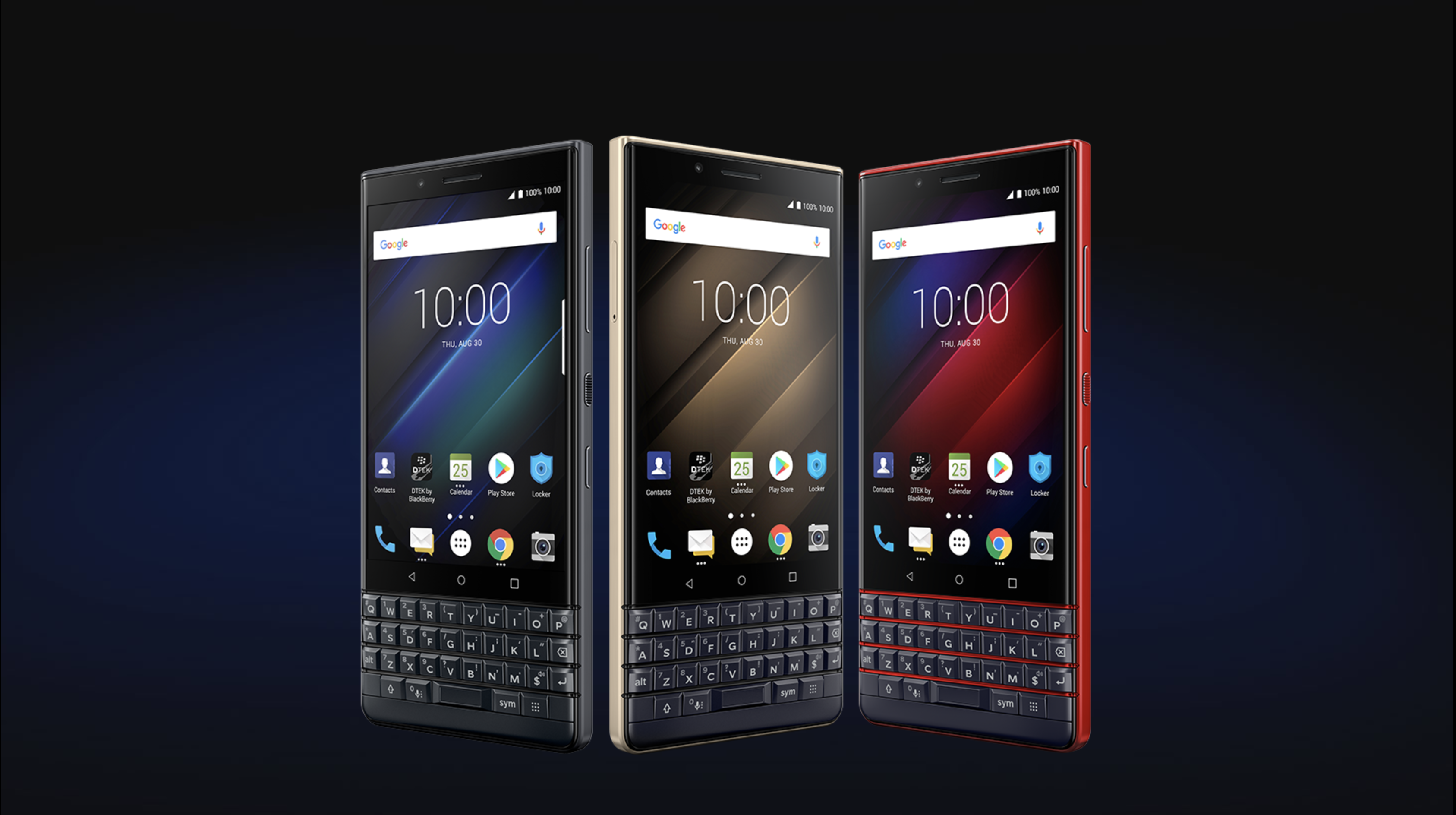

A new BlackBerry is coming in 2021 – will the brand have a successful comeback this time around?
Just when you thought 2020 was running out of surprises, we’re getting a new Blackberry smartphone next year.
The former mobile giant has agreed to licence the brand to OnwardMobility, a new Texas-based start-up made up largely of US tech and telecoms veterans. When the device launches, it will make OnwardMobility the third company to release an Android-based BlackBerry device in an attempt to emulate the brand’s late 2000s heyday, following BlackBerry’s own Priv in 2015, and TCL’s Key devices in 2017 and 2018.
While we don’t have an exact launch date yet, 2021 will mark a decade since BlackBerry’s global device market share reached its peak, before being steadily buried under an avalanche of iOS and Android devices throughout the 2010s.
Precise details are scarce, but OnwardMobility CEO Peter Franklin has confirmed that the device will be a “competitively priced global flagship” with 5G, will run on Android, and will have the physical keyboard that has always set BlackBerry apart from its competitors (for better and for worse).

Speaking to Mobile News, Franklin also said the new device would fulfil the need in the market for a consumer-ready smartphone “built from the ground up in terms of security”.
None of those USPs appear, however, to target any specific consumer or business pain points: Android is the most popular smartphone OS in the world, 5G is still mainly the preserve of flagships and, tellingly, no one makes smartphones with physical keyboards anymore. So where will a new BlackBerry smartphone fit in the present smartphone landscape?
Security
Since delegating its smartphone development to licensees, BlackBerry CEO John Chen has successfully turned the business around by moving into cybersecurity. Franklin said that OnwardMobility is working “closely” with BlackBerry to imbue the device with leading protection functions. If the new BlackBerry has a true USP aside from its keyboard, security looks likely to be it. But the device will still face an uphill battle to make an impression among both consumers and enterprises.
For a start, consumers simply aren’t that security-conscious when it comes to phones. According to data from GfK, just six per cent of UK smartphone buyers in the past year thought good security was an important factor in choosing a new handset, with just two per cent viewing it as the most important factor.
This means it looks likely that BlackBerry will seek to put significant effort into targeting corporate customers and governments; indeed, the inclusion of an executive vice president for government sales, Colin McWay, on OnwardMobility’s leadership team would suggest a proactive approach at courting state administrations.

However, corporates and governments have already benefited from nearly a decade of security from Android through its Android Enterprise Recommended system, Samsung’s Knox software or Apple’s strong iOS ecosystem, as well as myriad bespoke providers. So it’s not clear how BlackBerry can offer something that will provide a better experience than the market share leaders, say analysts.
“Knox is so sophisticated now, and lots of distributors have begun specialising in the credentials needed to deploy Android Enterprise Recommended at scale with factors such as zero-touch deployment and third-party enterprise mobility management platforms,” says Canalys senior analyst Ben Stanton.
“They can deploy it at scale, restrict app access and change device functionality with a high level of precision. BlackBerry would have to have something pretty secure up its sleeve to turn enough enterprises’ heads to buy a brand new suite of devices.”
This isn’t to mention the fact that BlackBerry’s current security offerings are device-agnostic – a key reason behind the company turning around its fortunes.
“If a safer iteration of Android is [OnwardMobility’s] argument, in most cases you’ve got the heavily supported solutions like Knox, and if a company has gone with BlackBerry software, that solution supports an enterprise irrespective of its devices, there’s no tie-up between BlackBerry’s business and its handsets,” says Ivan Donn, a business development consultant who worked for BlackBerry during its ascendancy in the early 2000s. “They’ve rightly made their enterprise security very broad church in its appeal.”
Those fond of BlackBerry will remember its OTT messaging service, BlackBerry Messenger (BBM). With the added security issues of employees scattered across different unsecure home networks, a secure communications platform could add strength to its pitch.
“Its best opportunity to grow would be to go with an additional secure private messaging system,” says IDC research manager Marta Pinto. She suggests that BlackBerry could, for instance, opt for some kind of easy-touse secure collaborative application for education or target niche segments in other business sectors.
Audience
As mentioned, BlackBerry has already looked to target corporate entities and governments in the past. However, Franklin also views consumers as key to OnwardMobility’s success rather than just corporate niches.
“I don’t think you can do a high-quality smartphone for B2B without consumer appeal,” he said. “We believe this will be a consumer-friendly device.”
Businesses are realising that the phones they give their employees need to be devices that they want to use. The advertising for the Samsung Galaxy Note20 is a case in point, giving equal weight to its being a productivity powerhouse and a nigh-on portable Xbox.
The problem is that the past few years have shown that consumers seem to have almost entirely abandoned the BlackBerry form factor, even though the device quality was considered fairly strong.
“TCL did a really good job,” says Donn. “The build quality of the devices was chalk and cheese with its Alcatel phones, and they had the extra software layer on top. They didn’t fail because they disappointed people, they failed because the market wasn’t there.”
When a smartphone’s display is nearly all screen and its built-in keyboard works better than a physical one, it may be a major challenge to go back. OnwardMobility may have found an unlikely design niche that integrates a keyboard with a desirable amount of screen real estate, but it remains to be seen how that might look.
Even if the device does convince, it faces a real struggle for market share. The woes of the consumer smartphone market are well-documented, with predictions for flat or single-percentage decline giving way to an even worse prognosis in the wake of the Covid-19 pandemic.
IDC predicts a year-on-year decline in UK smartphone sales of 12.8 per cent in 2020 and 5.5 per cent next year. Figures on the B2B market are harder to come by, but Gartner research vice president Annette Zimmerman recently described enterprise demand for new devices as “quiet” as businesses look to save costs – an ill omen for a brand trying to re-enter the market.
“If you want to break into B2B, you need distributors to partner with and they want you to bring money to the table,” says Stanton. “So they’ll need review units and brochures they can take to businesses, as well as funds to attend business events and provide training and field marketing. These are huge expenses, and part of the reason why Samsung and Apple are so dominant.”
He adds: “This new company is a bit of an enigma and hasn’t outlined many plans, but I haven’t seen anything to suggest it has the capacity to pick up where TCL wasn’t fully invested, which is the go-to-market strategy.”
5G
When he spoke to Mobile News, Franklin was excited about the possibilities of 5G, enthusing about potential (but vague) use cases for security with the new technology.
Unfortunately, now that the majority of white-collar urban workforces are working from home for the foreseeable future, 5G is less of a selling point, with home broadband usage rising sharply. It’s as much a headache for operators as it is for vendors.
“A huge spanner has been thrown in the works,” argues Donn. “The operator dogma from the past 35 years – start rollout in city centres and link up roads between them eventually – is totally flawed. You’ve now got to put 5G in the places where people live because that’s where they’re working.”
It’s not clear how much shifting attitudes to working from home have disrupted MNOs’ 5G roadmaps, but they need to start targeting the places where people live to maximise uptake.
Additionally, it is now a near certainty that Apple will have entered the 5G device game by the time the new BlackBerry launches, and there are even rumours that its delayed iPhone 12 will comprise four new devices.
“Next year, it wouldn’t surprise me if 5G becomes an extremely common feature on a smartphone, especially once Apple starts pushing in that direction as well,” offers Stanton. “If you can get 5G for £300 on a Motorola, it isn’t going to be the big differentiator against the competition.”
A 5G BlackBerry device would seem to make sense, especially if its makers consider it a flagship, but it will already be up against stiff competition.
Secure supply
In an interview with Engagdet, Franklin was keen to stress the security of the new phone’s supply chain, insisting that the device would be the most “American-made” smartphone in the world.
At the moment, this looks to be the new device’s one true claim to uniqueness if OnwardMobility can follow through on the promise. Given the current attitude of the US administration towards China and changing perceptions towards Huawei in key European markets, a secure supply chain could be a real coup.
“Supply-chain transparency is incredibly important at a government level, because if you’re handling sensitive information you need to know where the chipset is manufactured,” says Stanton.
But even then, he adds, this isn’t a mass market desire, and it would be difficult to manufacture market-grabbing volumes without going anywhere near China.
FIH Mobile, which will manufacture the new BlackBerry device, has factories in Vietnam, India and Mexico, which could exclude China from product assembly at least (and parent Foxconn even has a Wisconsin facility) – but it’s difficult to see how much negotiating heft OnwardMobility has when it comes to these decisions because of its position as a relatively unknown new company.
Nostalgia
The reality that OnwardMobility may have to face is that people have simply moved on from BlackBerry – and an appeal to nostalgia may not quite work in the same way that it has done for Motorola and Nokia devices when those vendors made a comeback in recent years.

While Motorola’s new Razr combines nostalgia for a bygone mobile era with a hot new form factor and HMD Global successfully fostered endearment for Nokia’s years of feature phone dominance at a time when smartphones weren’t as big as they are now, BlackBerry has already had two unsuccessful stabs at returning to the smartphone market.
“While the revelation that a company has decided to revive BlackBerry devices will spark a wave of nostalgia, it is hard to see how it will be a viable venture,” says CCS Insight chief of research Ben Wood. “The market has moved on dramatically since the heady days when the BlackBerry was the number-one smartphone.
“TCL tried to reboot the BlackBerry device franchise and despite getting some traction and delivering some interesting products, it eventually abandoned the project. It’s hard to see how someone else is going to be able to make a success of it in the current market.”
Onward… and upward?
On the other hand, having the brand could help OnwardMobility come more to prominence.
It’s worth noting that the company’s journey didn’t start with the aim of taking a new BlackBerry phone to market: the company formed with the goal of bringing out a new, hyper-secure device, before TCL handed it an opportunity by giving up the BlackBerry licence.
“It lined up almost too good to be true,” said Franklin – while analysts say that OnwardMobility’s link to a known brand could be a benefit for picking up awareness, even if BlackBerry’s brand persists largely through memories of a bygone era.
“Smartphones are largely very similar devices, so the brand has started to have an influence on people’s decision-making,” says Stanton.
“If you’re looking to break into smartphones with no brand whatsoever – which OnwardMobility was – getting hold of a brand can be a nice starting point.”
Strange Attraction
Meanwhile, the smartphone market exerts a strange pull, with those that have struggled in the past often seeking to return despite tightening margins.
Just look at HTC, LG and Sony, which constantly reaffirm their commitment to making smartphones despite them all seeing dramatic mobile revenue declines in recent years.
They have all been known for consumer and enterprise-favourite devices and innovations at some point, and want to believe that their brand equity still counts for something in the mobile space.
It’s understandable that BlackBerry, with a lingering pride in its handset business, would give the 5G smartphone era a go, and perhaps entrusting it to an unheard-of startup frees it of the pressure to succeed in terms of maintaining its reputation.
It’s probably for the best. Donn, who helped introduce the brand to the UK with Vodafone at the turn of the millennium, sees that success as unlikely.
“Coming into a market that is coming to a four-year average replacement cycle with a brand that stood for something 20 years ago but ceased to stand for something meaningful eight years ago – I think it needs more than that,” he says.
And Stanton agrees: “In this industry there are still some people who would buy a shoebox if it was made by BlackBerry and are incredibly excited by this news, but they’re few and far between.”






